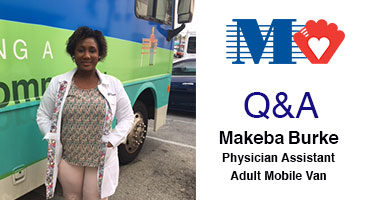Q&A with Makeba Burke - Physician Assistant Adult Mobile Van
December 06, 2019

Q: What do you do as a physician assistant?
A: My primary job is to provide care to uninsured or underinsured patients in the South Broward area, by traveling to those areas with the most needs. A part of that is providing care to the patients through telehealth visits. These innovative in-home telehealth visits facilitates care for patients with two or more chronic conditions with barriers to traditional primary care, who continue to miss appointments with their PCP or seek non emergent care in the emergency room (ER). This program provides a telehealth visit in the comfort of their home, while assessing and addressing patient’s barriers to care, such as transportation, food insecurity, and financial issues.
Q: It sounds like you’re out of the office a lot. Where do you go in the community, who do you see and what services do you provide?
A: We’re located in a RV, a mobile health center on wheels. The RV is my office. I’m out in the field with maybe one or two medical assistants. We provide services for patients in community settings, such as libraries, community centers, places of worship, and homeless shelters. The services that are provided includes; primary care services, HIV testing, and blood pressure and cholesterol screenings. Also, I review patient’s medications, provide refills, or prescribe any medications they may need. Patients may also obtain mammogram screenings and may qualify for a free mammogram through specific grants. In the mobile health center, adults are connected with a Memorial Eligibility Counselor, in order to apply for the Memorial Financial Assistance Program. Once approved based on income, patients are assigned to a primary care provider (PCP), and a patient centered medical home (PCMH) clinic, near their home. There are nine PCMH clinics throughout South Broward. Until the patient has health care coverage I serve as their primary care provider.
Q: Where were you born and where did you go to school?
A: I’m originally from Miami. I have a bachelor’s degree in biomedical science with a minor in public health and biophysics from the University of South Florida. I have a master’s degree in public health, with a specialty in health promotion and disease prevention, from Florida International University. I have my associate’s degree (physician assistant program) from Miami Dade College.
I came from FIU where I was in a program similar to what I’m doing now. I did household visits for uninsured patients. In addition, I helped decrease the ED utilization at South Miami Hospital through household visits as well. FIU, have a mobile unit program as well and I provided care to patients in that setting.
Q: What attracted you to Memorial?
A: Growing up, Memorial was one of the best hospitals to work for, so that was one thing. When I found out that they service the uninsured and the underinsured population, that’s what really grabbed my attention. I’ve always worked and love working with that population.
Q: Universal access to healthcare makes such a huge impact on the community. How do you feel about your role in the community?
A: I feel like everybody should have access to healthcare, regardless of whether they can pay or not. It brings me happiness and gratitude to know that I’m helping people that wouldn’t otherwise get this help or know where to get help from.
Q: How do you relax and have fun?
A: Travel. The last big trip I took was going to Europe. Every year I try to go out of the country or do something out of state. On the weekends, I usually go to the beach, read a book, or try to get to the gym. But traveling is my favorite.
Q: What is the best part of your job?
A: It’s rewarding to know that you’ve put a smile on a person’s face who was otherwise lost. During one visit, the patient came in confused and lost. At the end of the visit, they had some direction and had a smile on their face. When they leave with some type of guidance and they leave better than how they came in—that’s the most rewarding part of my job.
